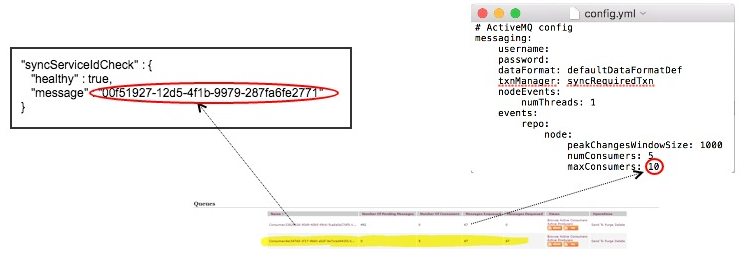- the ActiveMQ topic that is used to relay events from the repository to the synchronization service.
- the health of the synchronization service.
The health of the topic can be monitored using JMX and ActiveMQ advisories.
JMX
Make sure that JMX is enabled in ActiveMQ. For more information, see ActiveMQ - JMX.
org.apache.activemq:type=Broker,brokerName=localhost,destinationType=Topic, destinationName=VirtualTopic.alfresco.repo.events.nodes
org.apache.activemq:type=Broker,brokerName=localhost,destinationType=Queue, destinationName=Consumer.<SyncId>.VirtualTopic.alfresco.repo.events.nodes
where <SyncId> is a UUID that uniquely represents the synchronization service. This UUID can be obtained from the synchronization service health check.
Configure and Monitor Advisories
ActiveMQ supports advisory messages or advisories which are added to a standard topic when something happens in ActiveMQ, for example, when a message is consumed or if a message is discarded.
- sendAdvisoryIfNoConsumers (For the node events, this advisory is not sent because events are persistent)
- advisoryForSlowConsumers
- advisdoryForFastProducers
- advisoryForDiscardingMessages
- advisoryWhenFull
<policyEntry topic="VirtualTopic.alfresco.repo.events.nodes" advisoryForDelivery="true" advisoryForConsumed="true" advisoryForSlowConsumers="true" sendAdvisoryIfNoConsumers="true" advisoryForFastProducers="true">
For more information, see Handling Advisory Messages.
Synchronization service health check
The synchronization service exposes a collection of health checks that are useful in managing the synchronization service. The health checks include the status of the synchronization service's ActiveMQ, database, and repository connections.
GET https://localhost:9090/alfresco/healthcheck
{
"versionCheck" : {
"healthy" : true,
"message" : " 1.1-SNAPSHOT (2016-03-09T11:12:52Z)"
},
"eventsHealthCheck" : {
"healthy" : true,
"message" : "Ok"
},
"activeMQConnection" : {
"healthy" : true,
"message" : "ActiveMQ connection Ok"
},
"deadlocks" : {
"healthy" : true
},
"repositoryConnection" : {
"healthy" : true,
"message" : "Repository connection Ok"
},
"databaseConnection" : {
"healthy" : true,
"message" : "Database connection Ok"
},
"syncServiceIdCheck" : {
"healthy" : true,
"message" : "00f51927-12d5-4f1b-9979-287fa6fe2771"
}
}
The eventsHealthCheck attempts to evaluate health of the repository event tracking mechanism. In order to do this it requires access to the repository JMX endpoint (configured using the repo.jmx* properties in config.yml). If the repository JMX endpoint is not available, the synchronization service will continue to function, but the events health check will be unknown.
This table describes each part of the health check.
| Elements | Description |
|---|---|
| "eventsHealthCheck" : { "healthy" : true, "message" : "Ok" }, | This specifies if the health check is up to date. If the status is unknown, it could be that there haven't been any events since the last restart. If the sync service falls behind by 10 seconds or more, the healthy element of the health check would say false. |
| "activeMQConnection" : { "healthy" : true, "message" : "ActiveMQ connection Ok" }, | This specifies that the connection to ActiveMQ is healthy. |
| "repositoryConnection" : { "healthy" : true, "message" : "Repository connection Ok" }, | This specifies that the synchronization service can connect to SkyVault, for example, hostname and port in config.yml. |
| "databaseConnection" : { "healthy" : true, "message" : "Database connection Ok" }, | This specifies that the synchronization service is connected to the database and making successful SQL calls. |
| "syncServiceIdCheck" : { "healthy" : true, "message" : "00f51927-12d5-4f1b-9979-287fa6fe2771" } | This specifies the ID used in the connection to ActiveMQ to identify itself to the queue. See the |
This diagram shows the ActiveMQ queue consumer list. Here, the consumer name relates to the syncServiceIdCheck - message. Also, the Number of Consumers relates to the maxConsumers property which is specified in the config.yml file.

Logging
logging:
level: INFO
loggers:
"org.alfresco.service.common.auth": WARN
"org.apache.activemq": WARN
"com.sun.jersey.api.container.filter.LoggingFilter": WARN
"org.alfresco.service": INFO
appenders:
- type: console
threshold: ALL
timeZone: UTC
target: stdout
logFormat: "%-5level [%d{yyyy-MM-dd HH:mm:ss.SSS}] [%thread] %logger - %msg%n"
- type: file
threshold: ALL
timeZone: UTC
currentLogFilename: ./logs/sync-service.log
archive: true
archivedLogFilenamePattern: ./logs/sync-service-%d.log.gz
archivedFileCount: 5
logFormat: "%-5level [%d{yyyy-MM-dd HH:mm:ss.SSS}] [%thread] %logger - %msg%n"
Synchronization service metrics
GET https://localhost:9090/alfresco/api/-default-/private/alfresco/versions/1/metricsThe response is JSON and contains all the metrics collected by the synchronization service. In particular:
| Metric Name | Type | Description |
|---|---|---|
| nodeEventLag | Timer* | Specifies the time taken for events sent by the repository to be consumed by the synchronization service. It is measured in milliseconds. |
| nodeEventsBrokerTime | Timer | Specifies the amount of time the event spends in the (ActiveMQ) broker. |
| nodeEventBrokerLag | Timer | Specifies the lag between events being sent to the (ActiveMQ) broker by the repository and the time at which the broker receives the event. |
| nodeEventConsumerLag | Timer | Specifies the lag between the broker sending out events and the synchronization service consuming them. |
| lagBetweenEventCreateAndSend | Timer | Specifies the lag between the event creation time and the time the event is sent to the (ActiveMQ) broker. |
| syncsTimedOut | Meter** | Specifies the syncs that have timed out (possibly due to long query times). |
| syncFailuresMeter | Meter | Specifies the sync failures. |
| syncsTimer | Timer | Specifies the distribution of sync times. |
| timePerCommit | Timer | Specifies the node event database commit times. |
| timePerEventUpdate | Timer | Specifies the node event database insert times. |
| timePerGetChanges | Timer | Specifies the sync query times. |
*Timer measures the rate that a particular piece of code is called and the distribution of its duration. See Timers.
**Meter measures the rate of events over time, for example, requests per seconds. See Meters.
